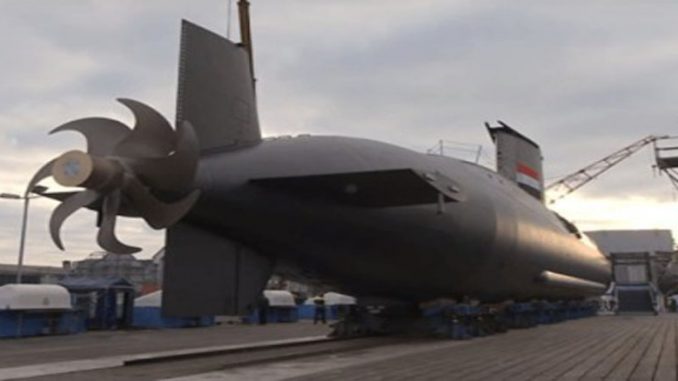
The Egyptian Navy received from ThyssenKrupp Marine Systems (TKMS) the first two of four Type 209/1400 mod diesel-electric submarines (SSK). ThyssenKrupp Marine Systems of Germany is a group and holding company of providers of naval vessels, surface ships and submarines.
TKMS’ CEO Dr. Peter Feldhaus commemorated the event saying, “We are proud to have reached this significant milestone in the construction program for the Egyptian Navy. This success was possible only thanks to constant further development of our products, an open and trusting dialogue with our customer as well as our highly motivated and skilled employees.”
The handover ceremony was attended by leading Egyptian Navy officials, including the Commander in Chief of the Navy Vice Admiral Osama Mounir Rabei.
Moreover, German officials also attended the ceremony, including Markus Grübel (Parliamentary State Secretary to the Federal Minister of Defense) and Vice Admiral Rainer Brinkmann (Deputy Chief of Staff of the German Navy) and others.
Egyptian-German naval submarine deal in 2012
Germany announced the naval submarine deal in 2012. Under the initial terms of the agreement, Germany would export four state-of-the-art military submarines to Egypt. On 10 December 2015, Germany completed the first submarine, according to the state-owned MENA news agency.
Despite the difficult financial economic crisis, the Egyptian government signed several arms deals with European countries.
Stockholm International Peace Research Institute (SIPRI), an international think-tank based in Sweden, documented in a report that Egypt’s arms imports rose by 37% between 2006 and 2010, and 2011 and 2015.
SIPRI calculates that the value of arms transfers to Egypt in 2015 reached US$1.475bn, compared to US$686m in 2010 and US$368m in 2014.
In addition, Egypt and Germany have signed a number of security cooperation agreements last July.
The agreements address a number of areas, including illegal immigration, counter-terrorism, and securing airports, as announced by the Egyptian interior ministry.
According to the statement, Egypt signed an intelligence-sharing agreement, an extradition agreement including Interpol Red Notice warrants and an agreement that would see Germany train Egyptian security personnel to investigate financial crimes.
The statement also said that the two ministers held talks at the German interior ministry headquarters in Berlin to review aspects of cooperation between the two ministries.
In addition, the German Interior Minister Thomas de Maizière visited Cairo at the end of March for two days.
During the visit, he discussed ways to enhance cooperation in areas such as security, counter-terrorism, airport security, and immigration.
Moreover, German vice-chancellor and minister of economic affairs Sigmar Gabriel announced that potential arms deal with Egypt during a press conference held in Cairo in April 2016.
Gabriel said at the press conference that “The Egyptian government did not ask Germany for a weapons deal during this visit, but there was a discussion about supplying two naval submarines. We are ready to fully cooperate with Egypt to secure its borders with Libya.”
Gabriel also said that, due to the current security situation, Egypt has “legal rights to ask for weapons.”
European countries continue to export arms Egypt despite Human rights abuses
European countries continue to arm Egypt’s al-Sisi despite the human rights abuses and violations in the country.
In May 2016, Amnesty International report condemned EU member states for supplying arms and equipment to Egypt despite the wave of unlawful killings, enforced disappearances and torture in the North African country, as reported by Amnesty.
The report said that despite the EU suspension on arms transfers to Egypt, almost half of European Union (EU) member states have violated the sanctions.
The report reads,” After hundreds of protesters were killed in a show of grossly excessive force by security forces in August 2013, 12 out of 28 EU member states have remained among Egypt’s main suppliers of arms and policing equipment. It is feared that EU Foreign Ministers could soon decide to scrap the current, already insufficient, suspension.”
According to Amnesty’s report, EU states authorized 290 licenses for military equipment to Egypt, totaling more than €6 billion (US$6.77) in 2014 alone. The items have included: small arms, light weapons and ammunition; armored vehicles; military helicopters; heavier weapons for use in counter-terrorism and military operations; and surveillance technology.
The EU countries who have been supplying arms to Egypt through exports or brokering since 2013 are: Bulgaria, Cyprus, Czech Republic, France, Germany, Hungary, Italy, Poland, Romania, Slovakia, Spain and the UK.
According to Privacy International, the Egyptian authorities were also supplied by companies from several EU countries, including Germany, Italy and UK, with sophisticated equipment or technologies destined for use in state surveillance, which Amnesty International fears may be used to suppress peaceful dissent and violate the right to privacy.
It is noteworthy that since the military coup led by Abdel Fattah al-Sisi against Egypt’s first democratically elected president Mohamed Morsi, the iron curtain has fallen on human rights in Egypt.
The Egyptian military regime has engaged in one of the widest arrest campaigns in the country’s modern history, targeting a broad spectrum of political opponents.
According to Human Rights Watch and local rights groups, “Between June 2013 and May 2014, the Egyptian authorities arrested or charged at least 41,000 people, and 26,000 more may have been arrested since the beginning of 2015.”
Enforced disappearance, arbitrary detention, military trials, and human rights violations at Egypt’s prisons have marked al Sisi’s reign.



